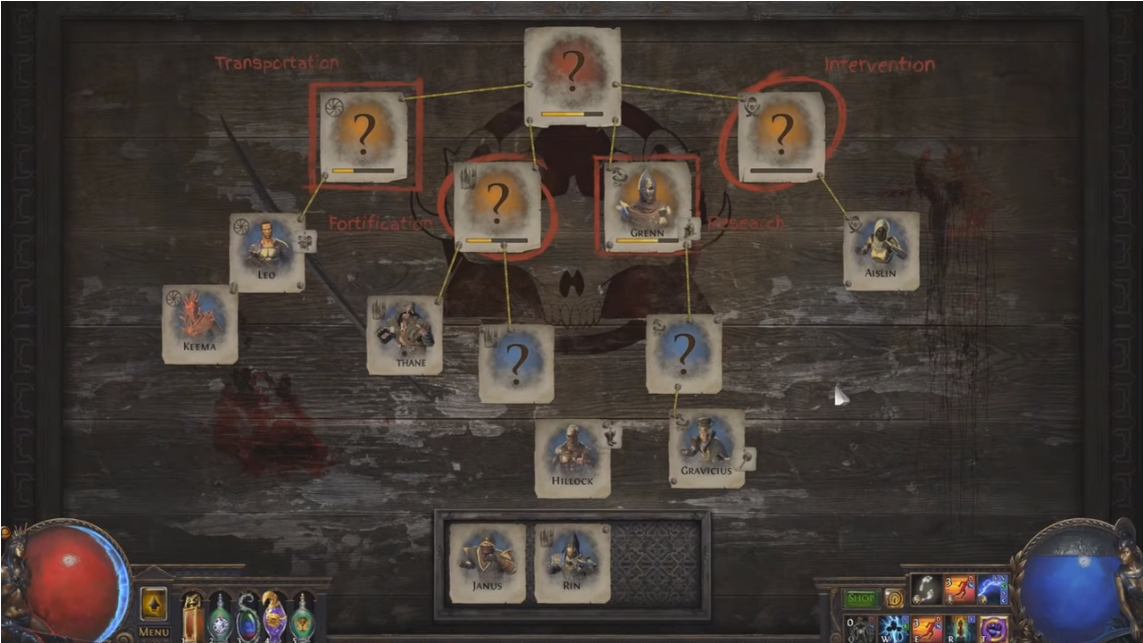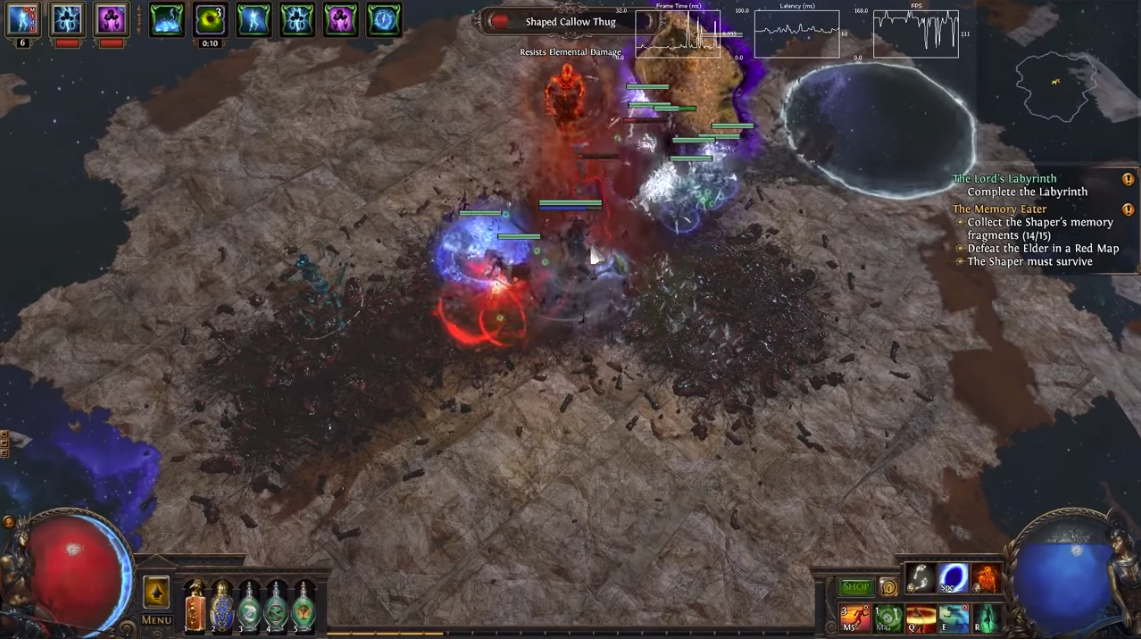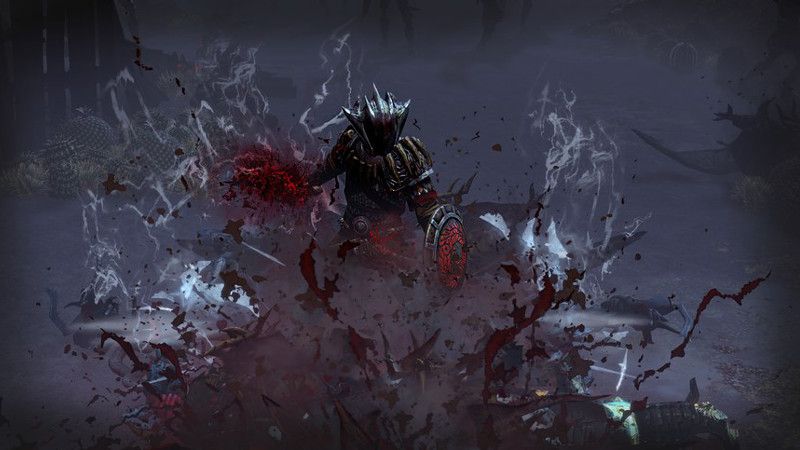Path of Exile: Betrayal is an expansion to the F2P open-world online third-person perspective action fantasy RPG, Path of Exile, that was released for Microsoft Windows by Grinding Gear Games in October 2013. As of August 2017, it was also accessible to Xbox One users, and the company plans on releasing a version for the PlayStation 4 in February 2019. This latest expansion is the largest one to date and was released on December 7, 2018.
As some players are new to Path of Exile, this summary will deal explore some basic gameplay mechanics as well as the new content introduced by Path of Exile: Betrayal.
The Premise

The syndicate now plans to overrun Wraeclast with their undead army. Therefore, Jun Ortoi and the other Masters are out to dissolve their organization and reclaim the Artifact. In order to ensure discretion, they are enlisting the player to assist them in altering the Syndicate members’ allegiances in order to uncover the Mastermind behind the Immortal Syndicate. The syndicate comprises of 18 members and it is the player’s task to discover their identities and manipulate them into revealing the secrets that will lead the them to the Immortal Syndicate’s Mastermind.
Gameplay

When players are creating their new character, they can choose whether they would like to play solo or multiplayer. If players select Solo Self-Found, they will not bump into other players outside of down, be able to form parties with other players or be challenged to PvP battles, but they will not be able to trade with them either. Furthermore, while players can switch to the regular mode at any time, they will not be able to revert back to Solo Self-Found.
Path of Exile: Betrayal offers players ten new Acts to play through. At the beginning of the game, Jun provides players with the identity of the first Syndicate member, Guff “Tiny” Grenn. The player will need to discover his lair, defeat his underlings and track him down. Players will then be able to choose from a number of interactions, including interrogation, bargaining, blackmail, execution and bribery in order to discover more information. They can also choose to imprison him for three turns. There are also only three prison slots, which means that simply imprisoning all caught Syndicate members isn’t an option.
Players can also manipulate his standing within the ranks of the Syndicate, which will either strengthen him or weaken him during their next encounter, as well as possibly govern the type of interaction that the and the Hero will have, as well as his relationship with other Syndicate members. Player will need to choose wisely, as their interactions will change how Syndicate members relate to each other.
Once the game is completed, players will unlock the Mapping stage, where players will need to collect maps to complete a series of challenges of increasing difficulty. The goal is to visit all map locations and complete all levels on all tiers. Completing each map will unlock rewards for the players. These maps can be played solo or in parties of up to six members. There are 150 different maps laid out on an Atlas, which are also ranked according to rarity and tier. Additionally, the Atlas is further divided into sixteen tiers, with higher-tiered maps only being attainable once the lower-tiered maps have been completed. Therefore, it will be pretty tough for players to acquire and complete all maps solo, especially when each map can only be activated once, generating six location portals also of one-time use. Therefore, each map can only be attempted six times before it is depleted, and a new map will need to be acquired. Alternatively, players could simply trade with other players for higher-tiered maps.
Character Creation
Each new expansion gives players the opportunity to opt into a new challenge league. This will allow them to create a new character from scratch, as well as to use all of the new mechanics and content, such as maps, dungeons, quests, Heroes, items and spells. Each league lasts three months, so the Betrayal league will only be around until February. There is also a Hardcore character option. When the character dies, all of the progress will be saved, but the character will be demoted to Standard, and will no longer be able to participate in the Hardcore mode. However, there are three permanent league modes that the player can play through as many times as they would like. Players can also save up to 24 characters, which allows for replaybility, especially if a player selects different Ascendency Classes and skills each time. Players can choose any name for their character provided that it hasn’t already been claimed by another player.
When creating their character, players can choose from seven core classes, each of which are associated with at least one of the main game attributes, namely intelligence, strength and dexterity. The base character will affect the player’s starting point on the passive skill tree, as well as the number of attribute points that are allocated to their attributes.
It will also affect the type of quest rewards that they will receive. However, what’s crucial to note is that while the characters start out in different positions on the passive skill tree, the player will be able to select new skills and branch out into whichever direction they would like as they gain more experience. The main difference between these classes therefore really lies in the type of Ascendency Class that the player will be able to choose from later on. Each class offers a selection of three Ascendency Classes. Attributes are important as they dictate whether players will be able to equip certain items and skills that they will acquire later in the game. There are over 1,500 skill nodes in the tree. Path of Exile: Betrayal has either revamped or completely introduced 10 skills.
Three of the character types are considered pure, as they only align with one of the core attributes to begin with. These are the Witch (intelligence) Marauder (strength), and Ranger (dexterity). Then there are the four hybrid classes, which start off with combinations of two or more attributes. These are the Templar (intelligence/strength), Duelist (dexterity/strength), Shadow (intelligence/dexterity) and the Scion (even distribution for all traits). The Scion is only unlocked when the player completes their first playthrough.
As the player progresses in the main Path of Exile leagues, they will unlock hideouts. They can then spend favor points to unlock decorations and can also invite masters and friends to visit them.
Items
Flasks are potion items. Players can only equip five of them at any time and can only be used a limited number of times before it is finished. This is determined by the number of charges that it has when initially equipped. But a flask’s charges can be regenerated by defeating monsters or by visiting a vendor in town.
Certain special items can only be gained through being crafted. This entails crafting recipes, which can either be bought, traded or found while adventuring. It is important to note that there is no in-game currency. Rather, players will need to barter their items according to the game’s item-value system. These items also have other properties such as stat-rerolls or other item modifications.
Real-World Currency Purchases
All in-game purchases are either cosmetic or organizational. This means that they will not impact gameplay, but may help with organizing one’s items and maps, generating more slots to store stash, and so on. This is useful, as when one’s stash is too full, players will need to return to town to store or trade unnecessary items. Therefore, the less frequently they need to do this, the better. The good news I s that armor isn’t included as part of a player’s inventory.

